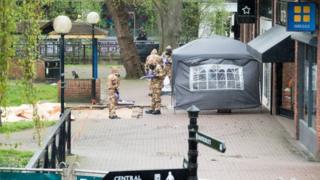 Image copyright
Getty Images
Image copyright
Getty Images
Salisbury is to be declared safe of the nerve agent Novichok almost a year after the Sergei Skripal poisoning.
The former Russian spy's house and 11 other potentially infected sites are expected to be ruled safe on Friday.
Military personnel have spent 13,000 hours on the clean-up after Mr Skripal and his daughter Yulia were targeted with the nerve agent on 4 March 2018.
Army Lt Gen Ty Urch said it had been "the longest running" operation of its kind on British soil.
An estimated 600 to 800 specially trained military personnel, including the chemical, biological, radiological and nuclear regiment, were involved in the clean-up.
The operation included taking thousands of test samples from across Salisbury and nearby Amesbury, where Dawn Sturgess, 44, was fatally poisoned in July.
The sites due to be declared decontaminated include the site of the park bench where the Skripals were found collapsed, the Zizzi restaurant where they had dined beforehand, and the home of Det Sgt Nick Bailey, who was exposed to the agent.
Other sites include Salisbury and Amesbury ambulance stations, Bourne Hill police station, Ashley Wood vehicle recovery yard and The Mill pub.
The 355-day operation also included the Amesbury home of Ms Sturgess' partner Charlie Rowley, 45, who survived after being exposed to the nerve agent.
A Boots pharmacy branch, Amesbury Baptist Church and ambulances used in the initial response also had to be decontaminated.
Lt Gen Urch, who oversaw military involvement in the clean-up, said the "slow, deliberate and detailed" operation had been "an amazing demonstration of physical and mental courage".
"Novichok is probably one of the most dangerous and most challenging chemicals in existence today and you don't need very much of it and it's highly spreadable," he said.
"I think our military personnel have demonstrated genuine courage."
He added that the teams involved in the clean-up would be "recognised in due course for their courage".